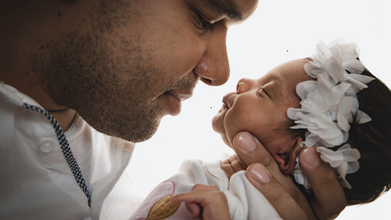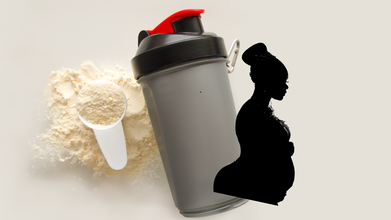- Health Conditions A-Z
- Health & Wellness
- Nutrition
- Fitness
- Health News
- Ayurveda
- Videos
- Medicine A-Z
- Parenting
- Web Stories
Stacey Hatfield, Australian Food Influencer, Dies Of A Rare Pregnancy Complication

Credits: GoFundMe
While most pregnancies normally and do not have any serious complications, notes Johns Hopkins Medicine, sometimes rare complications can occur and it can then interfere with normal fetal development. In such a case, Australian nutritionist and social media influencer Stacey Hatfield tragically passed away. Her husband described it as an “extremely rare complication” during childbirth. The 30-year-old Melbourne native was known for promoting toxin-free living and wholesome recipes under the handle @naturalspoonfuls, where she had more than 17,000 followers.
Hatfield’s pregnancy had been filled with joy and anticipation. She and her husband, Nathan Warnecke, were just two months away from celebrating their first wedding anniversary when she went into labour at home on September 29.
She gave birth to a healthy baby boy, Axel, fulfilling what Warnecke said was her “biggest dream in life — to be a mum.” But moments after delivering her son, the “unimaginable” occurred.
A Tragic Turn After Birth
According to Warnecke, Hatfield developed an “unforeseen and extremely rare complication” immediately after childbirth. She was rushed to the hospital, where medical staff did everything they could to save her life.
“Hospital staff were amazing and did the utmost to help, but ultimately nothing could be done despite their best efforts,” Warnecke said in a social media post announcing her passing. “Words can’t do justice to how devastating this is for myself and everyone that knew and loved her.”
He shared that Hatfield’s final moments were filled with love and happiness as she held her newborn son in her arms. “She held Axel when he was born, nursed him, saw that he was a boy, and loved him,” he wrote. “She loved him so much and still continues to love him.”
Remembering a “Lighthouse in the Storm”
Warnecke, who called Stacey his “beautiful wife, soulmate, and best friend,” said her passing has left a void that words cannot fill. “I knew Stace for nine amazing years — she was the light of my life and the reason I got up in the morning,” he said. “She was my lighthouse in the storm, and the world is less bright without her in it.”
He described her as “the most beautiful, loving, caring, hardworking, disciplined, intelligent, and trustworthy human being” he had ever known.
Community Support for the Family
In the wake of the tragedy, family, friends, and the wider community have come together to support Warnecke and baby Axel. A GoFundMe page has raised more than $20,000 to help cover funeral expenses, childcare, and household costs as the grieving family adjusts to life without Stacey.
What Are Some Of The Rarest Pregnancy Complications That Can Kill The Mother?
- Lower Urinary Tract Obstruction: a rare fatal condition that occurs when there is a blockage in the urinary tract of a developing fetus. In this condition, the urine cannot be drained, and the fluid around the fetus decreases.
- Amniotic Fluid Embolism: this is when amniotic fluid, cells, hair, or fecal matter of the baby enters the mother's blood circulation and leads to conditions like Disseminated Intravascular Coagulation (DIC).
- Pulmonary Embolism: this happens when the blood in mother becomes more coagulable and could sometimes form blood clots, known as thrombosis.
- Uterine Rupture: it is a rare complication, where the risk of it happening is less than 1%. If it occurs, it usually happens during labor.
What Conditions Can Lower the Chances of Men Having Children According To Doctor

Credits: Canva
While infertility has long been viewed as a women’s issue, experts stress that men account for nearly half of all cases. According to fertility specialists, male infertility contributes to around 40% of infertility cases, with female factors responsible for another 40%, and combined or unexplained causes making up the rest. Alarming trends show a steady rise in male infertility, largely due to low sperm count, lifestyle factors, and sexual health issues.
Dr. Avantika Vaze Parab, Fertility Specialist at Nova IVF Fertility, Vashi, Mumbai, explains that several reproductive health conditions in men can impact their ability to father a child, many of which are treatable if identified early.
Common Medical Conditions That Affect Male Fertility
One of the most common causes of male infertility is varicocele, a swelling of the veins in the scrotum that increases testicular temperature and hampers sperm production. “It often goes unnoticed but can be treated through medication or, in some cases, surgery,” says Dr. Parab.
Hormonal imbalances also play a significant role in fertility. Hormones such as FSH, LH, and prolactin, released from the pituitary gland, along with testosterone produced in the testes, are essential for healthy sperm production. Any disruption in these hormones can reduce sperm quality and quantity.
Infections of the reproductive tract, including untreated sexually transmitted infections (STIs) or illnesses like mumps during childhood, may cause long-term damage to sperm-producing tissues, leading to infertility.
When Sperm Can’t Reach the Ejaculate
In some men, sperm production occurs normally, but blockages in the reproductive tract prevent sperm from being ejaculated. “In such cases, sperm can still be retrieved directly from the testes through procedures like TESE (Testicular Sperm Extraction) or PESA (Percutaneous Epididymal Sperm Aspiration),” explains Dr. Parab. These sperm can then be used in advanced fertility treatments such as ICSI (Intracytoplasmic Sperm Injection), allowing men to father children with their own sperm despite the obstruction.
The Impact of Sexual and Lifestyle Factors
Sexual dysfunctions such as erectile dysfunction or premature ejaculation are another major contributor to male infertility. These issues are often linked to stress, obesity, or chronic conditions like diabetes, and they can strain both fertility and relationships.
Lifestyle habits also play a major role. Dr. Parab emphasizes that smoking, excessive alcohol consumption, obesity, lack of physical activity, and exposure to chemicals or radiation can all impair sperm health. “Even when sperm are produced, their count or motility may be too low for natural conception,” she notes. In such cases, assisted reproductive treatments like IUI (Intrauterine Insemination) or IVF/ICSI may be recommended.
Genetic and Hormonal Conditions
Certain genetic disorders, such as Klinefelter’s syndrome or Y-chromosome microdeletions, can lead to very low sperm counts or even azoospermia (zero sperm count). These require specialized diagnosis and fertility support.
Breaking the Stigma Around Male Infertility
Dr. Parab underscores that infertility is a shared responsibility, not solely a woman’s issue. “For generations, men have been hesitant to seek medical help due to social stigma,” she says. A basic semen analysis is often the first step for men who are trying to conceive.
Adopting a healthy lifestyle, quitting tobacco and alcohol, eating a balanced diet, exercising regularly, and consulting a doctor early can significantly improve fertility outcomes. “Seeking timely medical guidance helps men take the right steps at the right time,” Dr. Parab concludes.
Drinks That Are Safe To Consume During Pregnancy According To Doctor

Credits: Canva
Staying hydrated during pregnancy is crucial, but not every beverage that quenches thirst is safe for a mom-to-be. From morning coffee to bedtime teas, the choices can get confusing. So, how do you know which drinks are actually good for you and your baby?
We spoke to Dr. Sushruta Mokadam, consultant obstetrician at Motherhood Hospital, Kharadi, Pune, who rated the most common beverages consumed during pregnancy — from best to worst — and explained what makes them safe or risky.
Water
“Water is, without question, the safest and best drink during pregnancy,” says Dr. Mokadam. It aids digestion, maintains healthy circulation, and helps prevent dehydration, constipation, and urinary tract infections — all of which are common during pregnancy.She recommends drinking at least three litres of water daily. “If plain water feels boring, try adding slices of lemon, cucumber, or mint. Detox water can be a refreshing and healthy alternative,” she adds.
Milk
Milk is packed with calcium, protein, vitamin D, and iodine, all vital for the baby’s bone, tooth, and brain development. “Milk is one of the most wholesome drinks for expectant mothers, provided it’s pasteurized,” says Dr. Mokadam.
She advises choosing between low-fat or full-fat milk based on your dietary needs. For those who are lactose intolerant or prefer plant-based options, fortified almond or soy milk can be good substitutes — as long as they’re enriched with calcium and vitamin D.
Fresh Fruit Juices
Freshly squeezed juices provide a good dose of vitamins, minerals, and antioxidants. “Juices like orange, pomegranate, or apple can help boost your well-being,” explains Dr. Mokadam.
However, she cautions against overconsumption: “Juice lacks fiber and is high in natural sugars. One small glass a day is fine, but going overboard can lead to unnecessary calorie intake and affect blood sugar levels.”
Herbal Teas
Many pregnant women turn to herbal teas for relaxation or to ease nausea. “Mild herbal teas like ginger or chamomile in moderation can help with digestion or morning sickness,” says Dr. Mokadam.
But not all herbs are safe. “Avoid teas with licorice root, pennyroyal, or unknown herbal blends. Always check with your doctor before adding any herbal tea to your routine,” she advises.
Coffee and Black/Green Tea
Caffeine crosses the placenta and can affect the baby’s heart rate. “It’s best to limit caffeine to less than 200 mg per day,” warns Dr. Mokadam. That’s roughly one small cup of coffee or two cups of tea. Too much caffeine may increase the risk of miscarriage or low birth weight.
Soft Drinks, Energy Drinks, and Sugary Beverages
These are high in sugar, artificial additives, and caffeine, with no nutritional value. “They can increase the risk of gestational diabetes, excessive weight gain, or even affect fetal growth,” says Dr. Mokadam.
She advises cutting them out completely for better overall well-being.
Is Protein Powder Safe For Pregnant Women?

Credits: Canva
Pregnancy is a time when woman need to be extra careful with what they consume. There are always endless recommendations, and thus sometimes it could be difficult to separate fact from fiction, especially when it comes to protein intake. While protein is essential for everyone, however, during pregnancy, it plays a critical role in maternal health and fetal development.
Why Does It Matter?
A recent study has shown that lead has been found in popular protein powder, and the highest found in whey protein powder, or the plant-based protein powders. This is concerning, as protein are essential during pregnant as they contribute directly to the growth and development of the baby.
Proteins are made up of amino acids- body's building blocks. These amino acids help build and repair muscle and create hormones and produce enzymes.
A study published in Advances in Nutrition highlights that pregnancy is an “exceptional stage of life defined by rapid growth and development.” From just weeks after conception, the body adjusts protein metabolism to support fetal growth. Most protein deposits occur in the third trimester, reinforcing the importance of consistent protein intake throughout pregnancy.
Read: High Levels Of Lead Found In Protein Powders And Shakes, Reveals Consumer Reports
How Much Protein Do You Need?
Recommended protein intake usually varies by country, for instance in Australia, the RDI for pregnant women s around 60 grams per day, whereas 46 grams for non-pregnant women.
Are Protein Powder Safe During Pregnancy?
Yes, they are safe, unless they contain lead and other contaminants, which must be checked by the list published by the Consumer Reports and your local physician, gynaecologist and nutritionist.
There are several plant-based proteins that have the highest lead content in them, they are:
- Whey protein: Derived from milk; contains all essential amino acids. Not ideal for lactose-intolerant individuals.
- Hemp protein: Plant-based, safe for vegetarians and vegans.
- Pea protein: Plant-based, rich in branched-chain amino acids (BCAAs).
- Rice protein: Vegan-friendly, made from brown rice.
What Is An Alternative?
The RDI could be achieved with a manageable and balanced diet that includes:
Complete proteins: Lean meats, fish, eggs, dairy
Combined plant proteins: Legumes with grains or nuts (e.g., peanut butter on whole-grain toast)
A diet rich in fruits, vegetables, whole grains, legumes, nuts, and moderate protein sources, whether plant-based or animal, supports both maternal and fetal health. Weight gain is expected during pregnancy, and incorporating protein helps ensure that gain is nutrient-dense. For individual guidance, consulting a GP or dietitian is recommended.
Other alternatives like protein bars, or homemade bars, which use dates, nut butter, and seeds could be a healthier option as they do not contain added sugar.
© 2024 Bennett, Coleman & Company Limited

